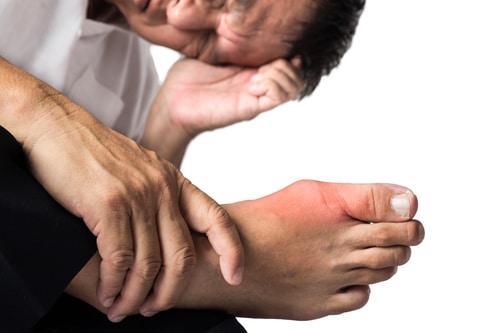Surmonter une poussée de goutte
Si vous demandiez à n'importe qui qui souffre de la goutte, il vous dirait que la douleur la plus terrible à vivre est une poussée de goutte.
Mon père souffre de la goutte. Je me souviens quand j'étais au lycée et qu'il a été diagnostiqué pour la première fois. Il est allé se coucher un matin en se sentant bien. Il s'est réveillé le lendemain matin et ne pouvait même pas mettre de pression sur son pied. C'était déconcertant.
Maintenant que je suis infirmière depuis dix ans, j'ai vu des choses assez intenses et vu des hommes pleurer parce qu'ils souffrent d'une douleur atroce. Pourtant, certaines personnes m'ont dit que la douleur de la goutte est très intense.
Voici donc quatre astuces que j'ai compilées - de mon expérience professionnelle et de mon expérience personnelle - qui peuvent vous aider à traverser une poussée de goutte.
Prenez vos médicaments
Vous vous souvenez quand on vous a remis une ordonnance pour des médicaments contre la douleur ou quand on vous a dit d'aller chercher un certain analgésique à la pharmacie ? On vous a probablement donné des instructions explicites sur la façon de prendre ces médicaments afin de réduire la douleur.
Eh bien, sortez ces instructions ou, mieux encore, appelez votre médecin.
Plusieurs médicaments sont souvent prescrits pour traiter la douleur associée à la goutte :
- Les anti-inflammatoires non stéroïdiens (AINS) tels que l'ibuprofène et le naproxène. Ils peuvent être achetés sans ordonnance. Ils réduisent la douleur tout en diminuant l'inflammation de l'articulation.
- Votre médecin peut également prescrire des AINS qui nécessitent une ordonnance, comme l'indométhacine.
- La colchicine peut également être administrée au début d'une poussée de goutte, mais ce n'est pas un médicament contre la douleur en soi. Selon WebMD, on pense que cela fonctionne en réduisant l'enflure et en diminuant l'accumulation de cristaux d'acide urique qui causent de la douleur dans l'articulation(s) affectée(s). La colchicine est administrée à une petite dose et augmentée graduellement, et peut également être administrée comme médicament quotidien pour prévenir les poussées de goutte.
- Les corticostéroïdes, comme la prednisone, peuvent être administrés sous forme de comprimé ou d'injection si la douleur ne répond pas aux AINS ou à la colchicine.
Reposez-vous
Lorsque vous avez été diagnostiqué avec la goutte, il est probable que votre médecin ait insisté sur l'importance d'ajouter de l'exercice à votre vie. Après tout, l'exercice peut améliorer la mobilité des articulations affectées et réduire le poids, ce qui est bénéfique si vous avez la goutte.
Alors pourquoi vous recommandé-je de vous reposer si vous avez une poussée de goutte?
Essayez de vous rappeler quand votre médecin vous a expliqué ce qui cause la goutte - votre douleur est essentiellement causée parce que des cristaux d'acide urique s'accumulent dans vos articulations. Lorsque vous bougez vos articulations, celles-ci bougent contre les cristaux, ce qui cause la douleur.
Lorsque vous êtes dans un état "normal", vous n'avez pas d'accumulation de cristaux d'acide urique. Je vous encourage vivement à suivre une routine d'exercice à ce moment-là.
Lorsque vous avez une poussée, l'accumulation de cristaux causera de l'inflammation. Le repos est crucial pour réduire l'inflammation - vous avez donc la permission de faire une marathon Netflix !
Appliquez de la glace
Appliquer de la glace sur l'articulation affectée est un autre excellent moyen de réduire immédiatement la douleur.
Cette méthode ne fera pas disparaître la douleur indéfiniment, du moins pas tant que les cristaux d'acide urique n'ont pas eu la possibilité de se résorber, mais elle peut temporairement réduire la douleur.
Pour ce faire, il suffit d'appliquer un sac de glace (ou tout aliment congelé) sur l'articulation affectée. Il est recommandé d'envelopper la glace ou la nourriture congelée dans un torchon - cela créera une barrière pour que vous ne placiez pas la glace directement sur la peau.
Buvez des fluides supplémentaires
La déshydratation peut déclencher une poussée de goutte. Pourquoi? Lorsqu'il y a moins de fluides dans le corps, la quantité d'acide urique dans le corps augmente. Lorsque les niveaux d'acide urique augmentent, les reins ne peuvent pas suivre.
Lorsque vous êtes en plein milieu d'une poussée de goutte, il est sage d'augmenter votre consommation de liquides. Cela inclut boire une quantité adéquate d'eau, surtout lors de l'exercice ou lorsqu'il fait chaud dehors.
Non seulement cela peut prévenir une poussée de goutte, mais cela peut également aider à "rincer" les cristaux du corps pendant une poussée.
Voilà donc quatre conseils pour vous aider à traverser une poussée de goutte !
Références
Fondation de l'arthrite (Gestion d'une crise de goutte)
WebMD (Vos déclencheurs de la goutte)
Bio de l'auteur :
Krystina Ostermeyer est une infirmière autorisée qui aime également écrire sur la santé et le bien-être. Elle possède une expérience variée en soins infirmiers et travaille actuellement en tant qu'éducatrice en diabète. Elle vit dans une petite ville avec son mari et son fils de deux ans. Vous pouvez trouver plus d'écrits de Krystina sur NewLifeOutlook..

